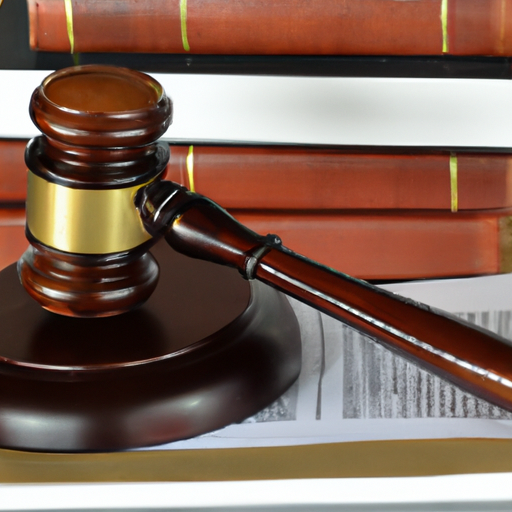When it comes to protecting your intellectual property, it is crucial to have a skilled and experienced lawyer by your side. As businesses continue to innovate and create valuable assets, the need for legal guidance in the realm of intellectual property has become more important than ever. If you find yourself in need of an intellectual property lawyer in Nibley, Utah, look no further. With a deep understanding of the complexities and intricacies of IP law, our lawyer is dedicated to helping businesses and business owners safeguard their creations and ideas. Through our informative blog posts, we aim to provide valuable insights, answer frequently asked questions, and instill confidence in our clients. Call us today for a consultation and take the first step towards protecting your intellectual property.
What is Intellectual Property?
Intellectual property refers to the legal rights that are granted to individuals or entities for their intangible creations or inventions. These creations can be in the form of ideas, inventions, brand names, logos, designs, literary works, music, or software. Intellectual property is protected by law to ensure that the creators are recognized and rewarded for their ingenuity, and to encourage the development of new ideas and innovations.
Definition of Intellectual Property
Intellectual property encompasses a wide range of intangible assets that are created by the human mind. It includes patents, trademarks, copyrights, trade secrets, and industrial designs. These rights provide the creators with exclusive control over the use and exploitation of their creations for a certain period of time.
Types of Intellectual Property
There are several types of intellectual property rights, each covering a different type of creation or invention:
-
Patents: Patents protect new inventions and technological advancements, granting the inventor the exclusive rights to use, sell, or license their invention for a specified period of time.
-
Trademarks: Trademarks are used to protect brand names, logos, and slogans. They prevent others from using similar marks that may cause confusion among consumers.
-
Copyrights: Copyrights protect original creative works such as books, music, paintings, and software. They give the creators the exclusive right to reproduce, distribute, and display their work.
-
Trade secrets: Trade secrets are confidential and valuable business information that gives a competitive advantage to the owner. This can include formulas, processes, strategies, customer lists, or other proprietary information.
-
Industrial designs: Industrial designs protect the aesthetic or visual aspects of any article, such as the shape of a product or its packaging.
Importance of Intellectual Property
Intellectual property is essential for fostering innovation, creativity, and economic growth. It provides incentives to inventors, artists, and creators to invest their time, effort, and resources into developing new ideas and works. By granting exclusive rights, intellectual property protection allows individuals and businesses to reap the rewards of their investments and encourages further innovation. It also promotes competition and prevents unauthorized use or infringement of valuable creations, ensuring a level playing field for businesses.
Role of an Intellectual Property Lawyer
An intellectual property lawyer plays a crucial role in protecting and managing intellectual property rights for individuals and businesses. They possess specialized knowledge and expertise in intellectual property law, allowing them to effectively handle various legal matters related to intellectual property.
Protecting Intellectual Property Rights
One of the primary roles of an intellectual property lawyer is to assist clients in protecting their intellectual property. This includes conducting thorough searches and investigations to ensure the uniqueness and availability of a proposed invention, brand name, or creative work. They help file patent applications, register trademarks, and obtain copyrights to secure legal protection for their clients’ intellectual property.
Enforcing Intellectual Property Rights
Intellectual property lawyers also play a vital role in enforcing the rights of their clients. They actively monitor the market for any unauthorized use or infringement of their clients’ intellectual property. In case of infringement, they initiate legal actions, such as sending cease and desist letters, negotiating settlements, or pursuing litigation, to protect their clients’ rights and seek appropriate remedies.
Advising on Intellectual Property Strategies
An intellectual property lawyer provides strategic advice to clients on managing and exploiting their intellectual property assets. They assist with drafting and negotiating licensing agreements, assignments, and other contracts related to the transfer or commercialization of intellectual property rights. They also advise on the development of comprehensive intellectual property strategies to maximize the value and protection of their clients’ intellectual property portfolios.

Why Hire an Intellectual Property Lawyer?
Hiring an intellectual property lawyer is crucial for individuals and businesses to effectively protect, manage, and exploit their intellectual property assets. Here are some reasons why hiring an intellectual property lawyer is important:
Expertise in Intellectual Property Law
Intellectual property law is complex and constantly evolving. A specialized intellectual property lawyer possesses in-depth knowledge and expertise in this field, ensuring that they stay updated with the latest legal developments and can provide the best advice and guidance to their clients. They understand the intricacies of intellectual property rights and can navigate the legal landscape to protect and enforce their clients’ interests effectively.
Navigating Complex Legal Procedures
Obtaining and protecting intellectual property rights often involves complex legal procedures and documentation. An experienced intellectual property lawyer can guide clients through these processes, ensuring that all necessary requirements are met and deadlines are adhered to. They handle the paperwork, negotiations, and interactions with government authorities, allowing clients to focus on their core business activities.
Maximizing Value of Intellectual Property
Intellectual property assets can have significant monetary value. An intellectual property lawyer can help clients maximize the value of their intellectual property by devising comprehensive strategies for commercialization and licensing. They ensure that their clients’ intellectual property rights are properly protected and monetized, leading to increased revenue and potential business opportunities.
Services Offered by an Intellectual Property Lawyer
An intellectual property lawyer offers a wide range of services to assist clients in managing and protecting their intellectual property. Some of the key services include:
Trademark Registration and Protection
Trademark registration is crucial for protecting a valuable brand name, logo, or slogan. An intellectual property lawyer assists clients in conducting trademark searches, filing trademark applications, and navigating the registration process. They also offer ongoing monitoring and enforcement services to protect trademarks from unauthorized use.
Copyright Registration and Enforcement
Copyright protection is essential for safeguarding literary, artistic, and creative works. An intellectual property lawyer assists clients in registering copyrights with the appropriate authorities. They also provide enforcement services to combat copyright infringement and protect their clients’ rights.
Patent Application and Prosecution
Patent applications require extensive documentation and technical expertise. An intellectual property lawyer assists clients in drafting and filing patent applications, conducting patentability searches, and prosecuting the application to secure patent rights. They also provide guidance on the maintenance and enforcement of patents.
Trade Secret Protection
Trade secrets are valuable assets that require careful protection. An intellectual property lawyer advises clients on developing trade secret protection strategies, such as implementing non-disclosure agreements, confidentiality protocols, and employee training programs. They also take legal action to prevent trade secret misappropriation and seek remedies in case of infringement.
Intellectual Property Audits
Intellectual property audits help identify and assess intellectual property assets, rights, and vulnerabilities. An intellectual property lawyer conducts comprehensive audits, reviewing clients’ intellectual property portfolios, and identifying areas of strength, weakness, or potential infringement risks. They provide valuable insights and recommendations to optimize their clients’ intellectual property strategies and portfolios.
Intellectual Property Disputes and Litigation
Despite proactive protection measures, intellectual property disputes can arise. An intellectual property lawyer has experience in handling intellectual property disputes and conducting litigation when necessary. Some key aspects of intellectual property disputes and litigation include:
Overview of Intellectual Property Disputes
Intellectual property disputes can involve claims of infringement, misappropriation, or unauthorized use of intellectual property rights. Common disputes arise from conflicts over patents, trademarks, copyrights, trade secrets, or domain names. These disputes can involve individuals, businesses, or even international entities.
Mediation and Alternative Dispute Resolution
Before pursuing litigation, intellectual property lawyers often explore alternative dispute resolution methods, such as mediation or arbitration. These processes aim to resolve disputes outside of court, and intellectual property lawyers can represent clients during these proceedings to negotiate favorable resolutions.
The Litigation Process
If alternative dispute resolution methods are unsuccessful, intellectual property litigation may be necessary. Intellectual property lawyers guide clients through the entire litigation process, which includes drafting legal documents, gathering evidence, conducting discovery, presenting arguments in court, and seeking favorable judgments or settlements.
Damages and Remedies
In intellectual property litigation, the successful party may be entitled to damages or other remedies. An intellectual property lawyer helps clients assess their options and seek appropriate remedies, which may include injunctive relief, monetary compensation for damages, or licensing agreements.
Intellectual Property Licensing
Intellectual property licensing involves granting permission to others to use or exploit intellectual property rights. An intellectual property lawyer plays a vital role in the licensing process. Here’s an overview of key aspects:
Understanding Licensing Agreements
Licensing agreements define the terms and conditions of the license, including the scope of rights granted, duration, royalties, or other financial considerations. An intellectual property lawyer helps clients understand the implications and intricacies of licensing agreements, ensuring that their rights and interests are protected.
Negotiating License Terms
An intellectual property lawyer assists in negotiating favorable license terms on behalf of their clients. They help clients determine the value of their intellectual property and secure fair compensation for its use. They also ensure that the license terms align with their clients’ business objectives and protect their intellectual property rights effectively.
Drafting and Reviewing License Agreements
Drafting and reviewing license agreements require attention to detail and a comprehensive understanding of intellectual property law. An intellectual property lawyer helps clients prepare and review license agreements, ensuring that all necessary clauses are included and their clients’ rights are adequately protected. They also ensure that the agreements comply with relevant laws and regulations.

International Intellectual Property Protection
In today’s globalized world, international intellectual property protection is crucial for businesses operating in multiple jurisdictions. An intellectual property lawyer can provide valuable guidance and assistance in international intellectual property matters. Here are some key aspects:
Overview of International IP Laws
Different countries have their own intellectual property laws, regulations, and procedures. An intellectual property lawyer helps clients navigate the complexities of international intellectual property laws, ensuring that their intellectual property rights are protected in various jurisdictions.
Filing International IP Applications
International intellectual property applications, such as patent or trademark applications, often involve multiple jurisdictions. An intellectual property lawyer assists clients in filing international applications and coordinating the necessary paperwork, translations, and filings to ensure compliance with each jurisdiction’s requirements.
Enforcing IP Rights Internationally
Enforcing intellectual property rights in foreign jurisdictions can be challenging. An intellectual property lawyer helps clients protect and enforce their rights internationally by collaborating with local counsel and utilizing international treaties and agreements. They take legal action against infringers and seek remedies in international courts or arbitration tribunals.
Intellectual Property and Technology Transactions
Intellectual property law intersects with technology transactions, such as mergers and acquisitions, technology licensing, and due diligence. An intellectual property lawyer provides essential legal support in these transactions. Here’s an overview:
Mergers and Acquisitions
In mergers and acquisitions, intellectual property due diligence is crucial to assess the value and legal status of intellectual property assets. An intellectual property lawyer helps evaluate the intellectual property portfolios of the parties involved, identifies potential risks or liabilities, and assists in structuring the transaction to protect and maximize the value of intellectual property assets.
Technology Licensing
Technology licensing involves the transfer of intellectual property rights from one party to another. An intellectual property lawyer assists clients in negotiating and drafting technology licensing agreements, ensuring that their rights are adequately protected and that the terms of the agreement are favorable to their clients’ interests.
Due Diligence for IP Transactions
In any transaction involving intellectual property, due diligence is essential to assess the intellectual property rights and potential risks. An intellectual property lawyer conducts thorough due diligence, reviewing relevant agreements, registrations, and other documentation to identify potential issues and advise clients on how to mitigate risks.

Frequently Asked Questions
What is the duration of protection for a trademark?
The duration of trademark protection varies depending on the country. In general, trademarks can be renewed indefinitely as long as they are being actively used and the renewal fees are paid. It is important to consult with an intellectual property lawyer to understand the specific duration of protection in the relevant jurisdictions.
What can be copyrighted?
Copyright protection extends to original works of authorship, including literary works, music, artistic creations, architectural designs, software code, and other creative expressions. However, copyright does not protect ideas, facts, or concepts. Consulting with an intellectual property lawyer can help determine what specific works are eligible for copyright protection.
How long does a patent last?
The duration of a patent varies depending on the type of patent and the country. In general, utility patents last for 20 years from the filing date, while design patents last for 15 years from the grant date. However, patent laws and regulations may vary, and it is important to consult with an intellectual property lawyer to understand the specific duration of patent protection.
What is trade secret misappropriation?
Trade secret misappropriation refers to the unauthorized disclosure, use, or acquisition of a trade secret. It involves the theft or improper dissemination of valuable business information, such as formulas, processes, customer lists, or proprietary data. Trade secret misappropriation can result in legal action and damages against the party responsible for the unauthorized use or disclosure.
What is the role of an intellectual property audit?
An intellectual property audit is a systematic review of an organization’s intellectual property assets, rights, and vulnerabilities. It helps identify and assess the value, strength, and risks associated with intellectual property. The role of an intellectual property audit is to provide insights, recommendations, and strategies for optimizing intellectual property protection, management, and commercialization.
Conclusion
In today’s increasingly competitive and innovative world, intellectual property rights are more important than ever. Protecting, managing, and leveraging intellectual property assets can significantly impact the success and growth of businesses. With the complex nature of intellectual property laws, it is vital to seek the expertise of an experienced intellectual property lawyer. From protecting and enforcing intellectual property rights to navigating complex legal procedures and maximizing the value of intellectual property, an intellectual property lawyer plays a crucial role in safeguarding and optimizing the intellectual property assets of individuals and businesses. If you require assistance with any aspect of intellectual property law, it is highly recommended to consult with a knowledgeable intellectual property lawyer to ensure that your rights and interests are effectively protected.





















































